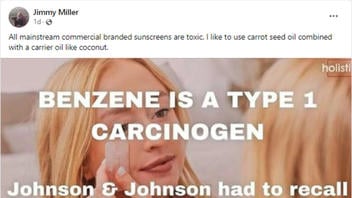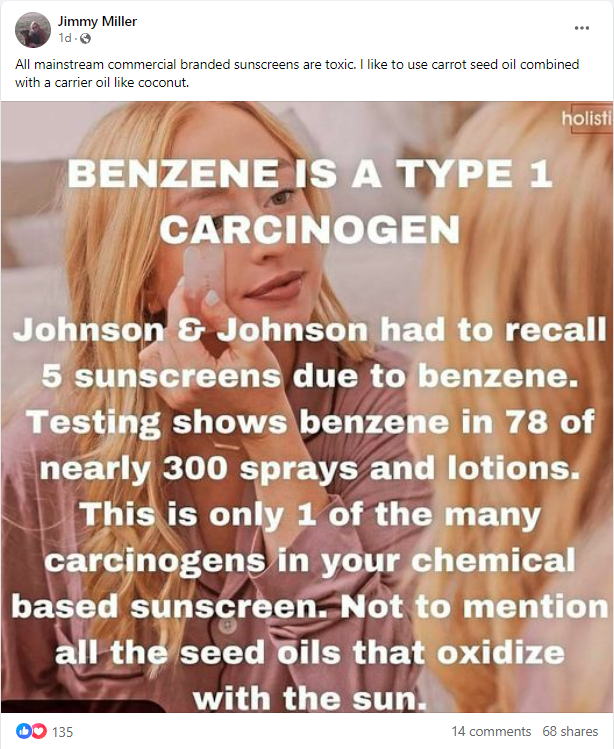STORY UPDATED: check for updates below.

Are all mainstream commercially branded sunscreens toxic? No, that's not true: The Food and Drug Administration regulates sunscreens to ensure they meet safety and effectiveness standards. While some sunscreens may contain ingredients that some people consider potentially harmful or irritating, all commercially branded sunscreens are not toxic in their formulation.
The claim appeared in a post (archived here) on Facebook by Jimmy Miller on April 29, 2024, with the caption "All mainstream commercial branded sunscreens are toxic. I like to use carrot seed oil combined with a carrier oil like coconut." The post's graphic said:
BENZENE IS A TYPE 1 CARCINOGEN
Johnson & Johnson had to recall 5 sunscreens due to benzene. Testing shows benzene in 78 of nearly 300 sprays and lotions. This is only 1 of the many carcinogens in your chemical based sunscreen. Not to mention all the seed oils that oxidize with the sun.
This is what the post looked like on Facebook at the time of writing:
(Source: Facebook screenshot taken on Wed May 1 15:34:19 2024 UTC)
Benzene contamination
While benzene, the carcinogenic chemical mentioned in the post's graphic, was found in several sunscreen product brands during a 2021 investigation (here and here), it was due to contamination, not because it's an approved ingredient. The website for the National Collaborating Centre for Environmental Health in Canada also said that "Benzene is not a standard ingredient of sunscreen."
Both Johnson & Johnson and the maker of Banana Boat recalled sunscreen products because of the contamination, the Associated Press reported. Because of the investigation, scores of sunscreen and after-sun products were pulled from store shelves.
Expert
Dr. Henry Lim, a dermatologist at Henry Ford Health, told Lead Stories in a May 1, 2024, phone interview that the discovery of benzene in sunscreens in 2021 was an aberration. When asked if all branded sunscreens are toxic, as the post claims, he said, "Absolutely not." Lim continued:
This is old news actually. The benzene in sunscreen was recorded by an independent laboratory ... The manufacturer recalled some of the sunscreen and since then, it has not been an issue. What had been found at that time ... it was a supply chain issue, resulting in some contamination. But since then, there have not been any further reports, any sort of testing, that reports sunscreen containing benzene.
Lim also said:
There is absolutely no evidence [all sunscreens are toxic]. Sunscreen has been used, as I'm sure you know, since the '70s and there have not been any reports. If it is toxic, we would have heard about it or have read about it. There is absolutely no credible scientific evidence to show that sunscreen has any negative health effect.
Food and Drug Administration
Sunscreens are governed by the Food and Drug Administration (FDA) as a non-prescription drug. In a May 8, 2024 email to Lead Stories, an FDA spokesperson said:
The FDA regulates sunscreens, which are nonprescription drugs, to ensure they meet safety and effectiveness standards Most sunscreens in the United States are evaluated under the over the counter (OTC) drug monograph system. OTC drug monographs are a kind of 'recipe book' covering acceptable ingredients, doses, formulations, and labeling. Products conforming to a monograph may be marketed without further FDA clearance, while those that do not, must undergo separate review and approval.
Additional details are available on the FDA's "Facts about Sunscreen" page.
Read more
Additional Lead Stories fact checks of claims related to sunscreen can be found here.
Updates:
-
2024-05-08T21:12:09Z 2024-05-08T21:12:09Z Adds context from a Food and Drug Administration spokesperson.


















